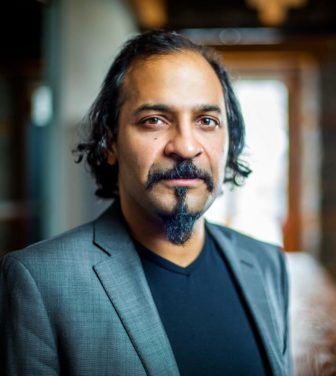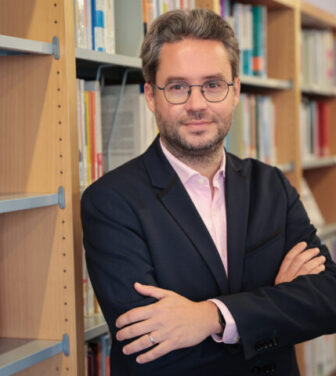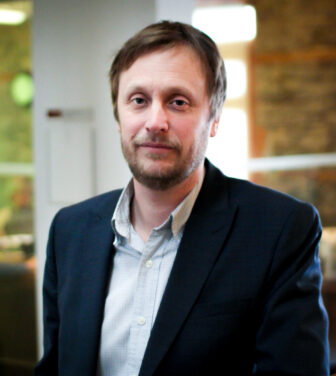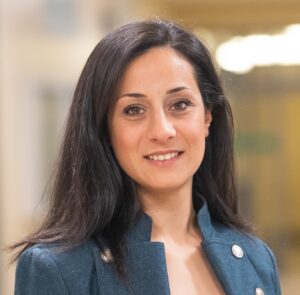CO-HOLDERS

Vivek Venkatesh, Ph. D.
Dean, Faculty of Education, James McGill Professor
Sylvain Delouvée
Senior lecturer in social psychology, Rennes 2 University
David Morin, Ph. D.
Full Professor, Faculty of Arts, Humanities and Social Sciences, Université de Sherbrooke
Marie-Eve Carignan, Ph. D.
Head of media division, Full Professor, department of communication, Université de SherbrookeMORIN, David – Ph. D.
David Morin is a tenured professor in the School of Applied Politics in the Faculty of Arts and Humanities at the Université de Sherbrooke. His areas of expertise and professional experience include national and international security issues, particularly violent extremism, radicalization, disinformation and conspiracy. He is a co-holder of the UNESCO Chair in the Prevention of Violent Radicalization and Extremism (UNESCO-PREV Chair). He served on the Expert Advisory Panel on Online Safety to provide advice to the Government of Canada on a legislative and regulatory framework to best address harmful content online. He also serves as a designated expert on the steering committee of the Francophone Network for the Prevention of Radicalization and Violent Extremism that could lead to Terrorism (FrancoPREV) supported by the International Organization of La Francophonie. Finally, in addition to his numerous scientific and practical activities, Professor Morin actively contributes to the public debate and the media on these issues.
DELOUVÉE, Sylvain
Sylvain Delouvée is a senior lecturer in social psychology at Rennes 2 University (France). He is co-director of the “Violence, Risks, Vulnerability” course (psycho-criminological and victimological approaches) in the Master’s degree in Clinical Psychology, Psychopathology and Health Psychology. His research focuses on the interaction between social and psychological factors that influence social thinking, beliefs and behavior when individuals or groups encounter situations that may be perceived as uncertain, risky or extreme. In more applied terms, it focuses on the processes of social and cognitive adaptation to environmental risks (e.g. climate change), health or biological risks (emerging infectious diseases, antibiotic resistance, vaccine hesitancy), societal risks (terrorism and radicalization) and the uncertainties associated with these situations.
VENKATESH, Vivek – Ph. D.
Dr. Vivek Venkatesh is Dean of the Faculty of Education and a James McGill Professor in the Department of Integrated Studies in Education at McGill University in Montreal, Canada. Since 2017, Vivek has held the UNESCO co-Chair in Prevention of Radicalisation and Violent Extremism. Vivek is a filmmaker, musician, curator and applied learning scientist whose research and research-creation programs focus on community resilience and pluralism through a resolutely public pedagogical approach. He is the co-founder of Project SOMEONE (Social Media Education Every Day) – an international initiative that has worked directly with more than 21,000 people in 13 countries – and which builds online and socio-pedagogical spaces to promote pluralism and prevent xenophobia. Vivek has co-produced and co-directed documentaries about underground cultural scenes including Blekkmetal (2015), Where in the hell is the Lavender House? (2019) and Enslaved 25 (in post-production). Vivek’s current research-creation works engage the multiple challenges of discrimination at their roots through the development of four unique participative artistic projects: BANAL, Halka, Landscape of Hate and Landscape of Hope. All four projects expand knowledge mobilization activities far beyond traditional academic paths, and include film and music production, and curation of live performances by musicians, visual artists, filmmakers, and writers. These projects have reached more than 6,500 people at festivals in Canada, Norway, Mexico and Iceland. Vivek is co-editor of the book series titled Extremity in Society and Culture, being published by Rowman & Littlefield/Lexington Press.
CARIGNAN, Marie-Eve – Ph. D.
Marie-Eve Carignan, PhD, is a full professor in the Department of Communication at the Université de Sherbrooke, co-holder and director of the Media Pole of the UNESCO Chair in the Prevention of Violent Radicalization and Extremism (UNESCO-PREV Chair). She is a professor-researcher with the Groupe de recherche en communication politique (GRCP), a regular researcher with the Centre de recherche Société, Droit et Religions de l’Université de Sherbrooke (SoDRUS) and an associate researcher with the Laboratoire interdisciplinaire sur les risques et les crises (LIRIC), the Centre de recherche sur la régulation et le droit de la gouvernance (CrDG) and the Centre de recherche sur l’enseignement et l’apprentissage (CREA). She holds a doctorate in communications from the Université de Montréal, as well as a doctorate in information and communications from the Institut d’études politiques d’Aix-en-Provence, obtained with unanimous congratulations from the jury.
Professor Carignan‘s research focuses mainly on media content analysis, the impact of media on society, misinformation, risk and crisis communication, and communication strategies. She has contributed to several collective works and published in national and international journals in communications, health, journalism, politics and history. Marie-Eve Carignan is co-author of the books “La Maison-Blanche vue du Québec: La couverture des élections américaines par les médias québécois”, published by Éditions La Presse in 2021, and “Mon frère est complotiste: rétablir le lien et le dialogue social”, published by Éditions de l’Homme in November 2022.
She has extensive professional experience in communications, strategic analysis, media relations and public relations in both small and large organizations. She regularly appears as a guest expert in the national and international media, and as a speaker and trainer in various public forums. Involved in major scientific initiatives, she sits on the steering committee of the Science First project, as well as on the Comité national de rapprochement, Arts, Culture et Santé. She is also a member of the Government of Canada’s National Expert Panel on Countering Radicalization to Violence.
DIRECTOR OF THE UNESCO-PREV CHAIR'S SCIENTIFIC COMMITTEE
COLIN, Mathieu – Ph. D.
Mathieu Colin is an associate professor at the School of Applied Politics at the University of Sherbrooke, scientific director of the UNESCO Chair in the Prevention of Violent Radicalization and Extremism, and a postdoctoral fellow at the Center for Interdisciplinary Research on Diversity and Democracy (CRIDAQ). He holds a PhD in Religious Studies from the University of Montreal and specializes in political and religious radicalism, as well as terrorism and extremism. In this context, he studies conspiracy theories, disinformation, and far-right ideologies, including accelerationism and neo-Nazism. He is also interested in the links between politics and religion in the United States, as well as contemporary Satanism.

GENERAL COORDINATOR
AL BABA DOUAIHY, Sylvana – Ph. D.
Sylvana Al Baba Douaihy is the General Coordinator of the UNESCO Chair in the Prevention of Violent Radicalization and Extremism (UNESCO-PREV). She holds a doctorate in contemporary religious studies. With a background in computer engineering and a teaching experience where she was interested in the digital transformation of contemporary societies, Ms. Al Baba Douaihy is undertaking a post-doctoral fellowship in the field of cyber security in the fall of 2022. In collaboration with the Groupe de recherche interdisciplinaire en cybersécurité (GRIC) of the Université de Sherbrooke and under the supervision of Professor Hugo Loiseau (Faculty of Arts and Humanities, School of Applied Politics), she will carry out a number of research, training and knowledge transfer tasks aimed at better understanding the geopolitical issues of cybersecurity of energy infrastructures in North America, particularly with respect to hydroelectric networks. As part of the Intersectional Comparison of Critical Infrastructure in Canada (Energy, Finance, Governance and Health) project and in partnership with the Faculty of Law, Ms. Al Baba Douaihy is also co-leading a project on the governance of cyber security of critical infrastructure in Canada. Finally, she is participating in a Franco-Quebec collaboration on cybersecurity issues for the Paris 2024 Olympic Games. Ms. Al Baba Douaihy is also a professor in cybersecurity at the École supérieure d’études internationales de l’Université Laval.

